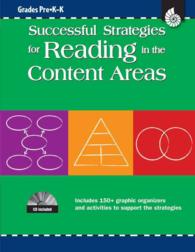Full Description
High-quality preschool programs are essential to improving children's outcomes in reading achievement and leveling language and literacy disparities among students from diverse backgrounds. Grounded in state-of-the-art research evidence, this practice-oriented book demonstrates how preschool professionals can create, evaluate, and sustain exemplary programs. Chapters from leading authorities cover coaching, assessment, and differentiation, as well as explicit strategies for teaching English language learners and helping at-risk readers. Discussion questions and suggested activities for professional development are included, as are reproducible assessment forms and planning tools for use in the classroom.
Contents
Foreword, William H. Teale
I. Background
1. Evidence for Creating, Expanding, Designing, and Improving High-Quality Preschool Programs, Andrew J. Mashburn
2. The Scientifically Based Reading Research Approach to Early Literacy Instruction, James F. Christie
3. Establishing a Science of Professional Development for Early Education Programs: The Knowledge Application Information Systems Theory of Professional Development, Sharon Landesman Ramey and Craig T. Ramey
II. Professional Development and Teacher Support
4. Models for Coaching: Making Them Work for Preschools, Sharon Walpole and Carla K. Meyer
5. Mentoring Preschool Teachers, Shelley Gray
6. Formative Assessment of Classrooms: Using Classroom Observations to Improve Implementation Quality, Bridget K. Hamre, Jennifer LoCasale-Crouch, and Robert C. Pianta
7. Are Early Childhood Classrooms Preparing Children to Be School Ready?: The CIRCLE Teacher Behavior Rating Scale, Mike A. Assel, Susan H. Landry, and Paul R. Swank
8. It's in the Details: Approaches to Describing and Improving Preschool Classrooms, David K. Dickinson, Betsy G. Watson, and Dale C. Farran
III. Optimizing Early Learning Environments
9. Characteristics of Classroom Environments Associated with Accelerated Literacy Development, Renée Casbergue, Lea M. McGee, and April Bedford
10. Increasing Children’s Learning by Getting to the Bottom of Their Confusion, Judith A. Schickedanz
11. Strategic and Intentional Shared Storybook Reading, Sonia Q. Cabell, Laura M. Justice, and Carol Vukelich
12. Differentiating Instruction in the Preschool Classroom: Bridging Emergent Literacy Instruction and Developmentally Appropriate Practice, Terri Purcell and Catherine A. Rosemary
13. Language and Literacy Practices for English Language Learners in the Preschool Setting, M. Adelaida Restrepo and Virginia Dubasik
IV. Making Data-Based Decisions
14. Quality Counts: Design and Use of an Early Literacy Program Review Tool, Kathleen A. Roskos and Carol Vukelich
15. Indicators and Goals of High-Quality Program Evaluation for the Preschool Classroom, Khara L. Pence
16. How to Evaluate a Screening Process: The Vocabulary of Screening and What Educators Need to Know, Christopher Schatschneider, Yaacov Petscher, and Kellee M. Williams
17. Curriculum-Based Measurement of Preschoolers’ Early Literacy Skills, Tanis Bryan, Cevriye Ergul, and Karen Burstein








